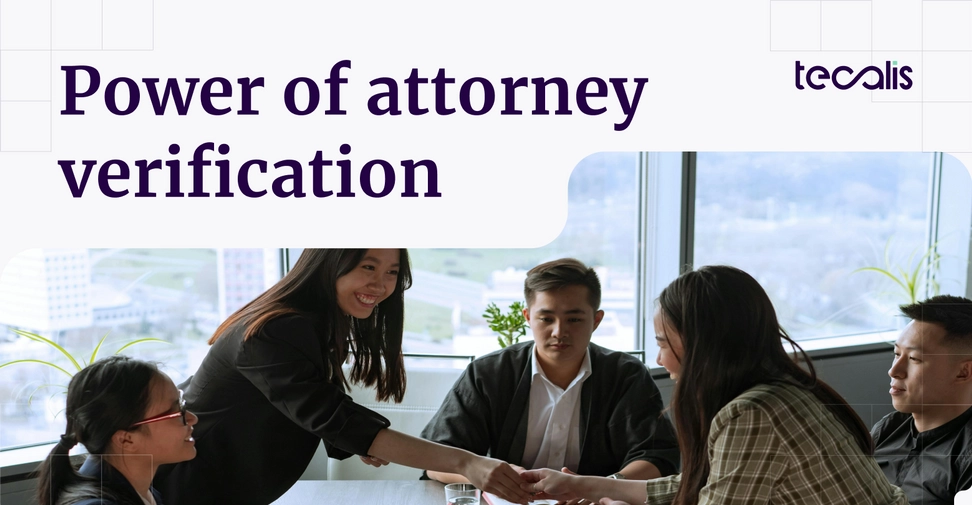Index
Get the latest news right in your inbox
In the legal, financial and banking areas, notarization plays a crucial role in the verification and authentication of powers of attorney granted to individuals or entities to act on behalf of others. Increasingly, B2B (business to business) and B2G (business to government) processes and transactions need to be validated. The risks of fraud and other illegitimate situations can be really damaging in this type of processes and procedures, so it is important to perform reliable checks prior to the execution of contracts or transactions.
In this article, we will explore in detail and in great depth what is involved in the power of attorney verification, notarization meaning, how it is carried out manually and automatically, as well as its relevance in different legal and financial contexts.
What is power of attorney verification and notarization
Power of attorney and notariation are documentation verification processes that guarantee the authenticity and validity of the powers granted to one or more persons or entities to act on behalf of other persons or entities. Also referred to as power of attorney verification, this process determines that the person performing a transaction or operation on behalf of another has sufficient power to carry out this action with the consent of the other parties involved.
In its most precise essence, the meaning of notarization is the verification and validation of legal documents, specifically powers of attorney. This process ensures that the powers of attorney conferred to an individual or entity are authentic, have not been altered and are in compliance with applicable laws and regulations.
The main purpose of the power of attorney notarization is to prevent fraud and to guarantee the legitimacy of actions performed on behalf of third parties. In this way, it is reliably verified that a person or entity has been authorized to act on behalf of another, legal or otherwise, in legal, financial or commercial matters. This process ensures that stakeholders can have confidence in the legitimacy of the powers conferred and make informed decisions based on that confidence.
Thus, the verification of powers of attorney is a legal and administrative process that is performed before a transaction or operation of relative importance takes place. It is a crucial step to ensure legal certainty in transactions and to protect the rights of the parties involved in the future agreement or action.
In the legal context, the notarization of powers of attorney refers to the verification that the powers or powers of attorney conferred to a representative are sufficient for him to perform a certain act or procedure on behalf of his principal, since these powers may confer authority to perform a certain act or procedure but not others.

How to perform power of attorney notarizations
The power of attorney verification process involves a thorough review of the relevant legal documents, such as notarial deeds, powers of attorney and any other documentation related to legal representation.
In layman's terms, notarizations corroborates the authenticity of the signatures, performs an identity verification of the parties involved, the date the power of attorney was granted and any other relevant details according to local, regional and international laws as the case may be.
The notarization of powers of attorney can vary by jurisdiction and regional practices, but generally involves a thorough review of the relevant legal documents as mentioned above. Legal RegTech professionals, such as notaries, lawyers or qualified trust service providers, usually perform the notarization, checking every detail of the document and ensuring that it complies with the established legal requirements.
Manual document review is a laborious and error-prone process, especially when dealing with large volumes of documents in companies with many B2B operations. However, with advances in technology, proxy reviews have become more efficient and accurate through the use of automation tools and specialized software.
Steps in the process and procedure of the fairing process
As mentioned above, the power of attorney notarization procedure varies according to the country, the region and the nature of the act or procedure to be carried out after this notarization. It is also different according to the organization, institution or company requesting the execution of this procedure: financial and banking institutions perform it in a different way than some regional administrations (they differ in the level of requirements and the way in which the documents are presented).
However, in general, and as a general summary, the steps to be followed in the process of granting powers of attorney are the following:
Stage 1: Granting of power
1. Choice of the type of power of attorney: The principal must choose the type of power of attorney he/she wishes to grant to his/her agent. Although this process does not really fall within the so-called "power of attorney verification", it must be done and lays the groundwork for the checks to be carried out.
- General Power of Attorney: Allows the representative to act on behalf of the principal in a wide range of matters.
- Special Power of Attorney: Allows the representative to act on behalf of the principal in a specific matter.
2. Drafting the power of attorney: The power of attorney must be in writing and must contain the following information:
- Data of the principal: Tax and identity information of the issuer of the power of attorney.
- Data of the representative: Complete information of identity and taxation of the attorney-in-fact or representative.
- Powers conferred: Description of the powers granted to the representative.
- Place and date: Place and date on which the power of attorney is granted.
3. Signature of the power of attorney: The power of attorney must be signed by the principal.
- Signature before a notary: If the power of attorney is granted before a notary, the notary will attest to the identity of the principal and the capacity of the principal to grant the power of attorney.
- Signature before a public officer: If the power of attorney is granted before a public officer, the latter will attest to the identity of the principal.
- Private signature: If the power of attorney is granted between private individuals, the principal must sign the power of attorney in the presence of witnesses.

Stage 2: Presentation of the power of attorney
1. Initiation of the process at the entity or authority: The representative must present the power of attorney to the entity, company or authority before which he/she wishes to act or with which he/she wishes to carry out a transaction.
2. Request for notarization: The representative must request notarization of the power of attorney with the entity or accept the request for notarization by the organization that wishes to verify its veracity.
3. Documentation to be submitted: The representative must submit the following documentation: The original power of attorney signed by the principal, documentation of the representative's identity and, in some cases, organization or company may request additional documentation as part of the due diligence process.
Stage 3: Verification of the power of attorney. Notarization process.
1. Verification of the authenticity of the power of attorney (notarization): The entity or authority will verify the authenticity of the power of attorney with all the anti-fraud controls provided by its RegTech partner.
- If the power of attorney was granted before a notary, the signature of the notary shall be verified; if it was granted before a public official, it may be consulted in governmental databases or with the methods communicated by the issuing agency; and if it was delivered between private individuals, the signatures of the principal and those of the witnesses shall be verified.
2. Verification of the representative's capacity: It will be verified that the representative has the legal capacity to act on behalf of the principal. For this purpose, fast technologies for automated reading of documentation provided by official QTSP partners can be used, for example.
3. Verification of the powers conferred: The company or institution shall verify that the powers conferred to the representative are sufficient to carry out the act or procedure to be performed.
Stage 4: Power validation
1. Communication to the representative: The representative will be informed whether the proxy is valid or not, with differences between the results:
- Valid power of attorney notarization: If the power of attorney is valid, the entity or authority will give its approval and the representative will be able to carry out the act or procedure on behalf of the principal.
- Invalid power of attorney notarization: If the power of attorney is invalid, the procedures and transactions cannot be carried out and a secondary verification process will be initiated to analyze the causes of the KO.
The terms and time it takes for the notarization process may vary depending on the entity or authority to which the power of attorney is submitted, especially if it has or does not have RegTech technologies to speed up this process. In the same way, the cost of the power of attorney notarization process may also vary depending on the tools available to the validating personnel.

What the power of attorney verifications are for
Powers of attorney are essential to ensure security and legitimacy in a wide range of legal and financial transactions. They allow the parties involved in a contract, transaction, operation or agreement to be certain that the person acting on their behalf is duly authorized, is who he or she claims to be and has the necessary powers to do so. In addition, a Quantification helps prevent potential future litigation by ensuring that all parties are in compliance with legal requirements.
Power of attorney notarizations are essential in a wide variety of legal and financial transactions, as well as in everyday situations where legal representation is required. Some common examples of situations where power of attorney is used include:
- Property transfers: Before transferring ownership of real estate, it is necessary to verify that the seller has the legal powers to do so.
- Banking transactions: Banks usually require a power of attorney before allowing a legal representative to carry out transactions on behalf of a company or individual.
- Management of legal matters: In legal proceedings, it is crucial that lawyers have the necessary powers to represent their clients in a legal and valid manner.
In short, power sums are critical to ensure security and legitimacy in a variety of transactions across industries.
Examples of power of attorney verifications
A common example of notarization is when a company grants powers of attorney to an attorney or legal representative to act on its behalf in legal proceedings. Before the attorney can take any legal action on behalf of the company, the powers granted must be properly verified and confirmed through the notarization process.
Another concrete example of a power of attorney notarization is when a company grants power of attorney to a lawyer to represent it in a legal proceeding or to an employee to perform actions on its behalf. Similarly, when an individual grants a power of attorney to a legal representative to carry out a banking transaction on his or her behalf, notarization is required. Before the representative can carry out the transaction, the powers of attorney conferred must be corroborated by notarization by the bank to ensure their authenticity and validity.
In general, power of attorney verifications are used in a wide variety of situations, such as:
- Purchase and sale of real estate: The buyer may grant a power of attorney to a representative to sign the purchase contract on his behalf.
- Opening a bank account: The account holder may grant a power of attorney to a representative to manage the account on his or her behalf.
- Representation in a lawsuit: The plaintiff or the defendant may grant a power of attorney to an attorney to represent them in a lawsuit.
- Grant application: The beneficiary of a grant may grant a power of attorney to a representative to carry out the necessary procedures to obtain the grant.
Banking Notarization
Banking notarization is an important subset of general notarization, which focuses specifically on the validation of powers of attorney related to financial and banking transactions. In this example of power of attorney validation, banks typically require documentation and identity verifications before allowing a legal representative to perform transactions on behalf of a company or individual, such as: opening accounts, signing contracts or making fund transfers.
In this way, the bank audit is particularly relevant in the context of fraud prevention and the protection of the financial interests of the parties involved, being closely related to AML (Anti-Money Laundering) processes and KYC (Know Your Customer) forms.
By verifying the authenticity of powers of attorney, banks can mitigate the risks associated with financial transactions and ensure regulatory compliance at all times. In the BFSI (Banking, Financial Services and Insurance) arena, power of attorney notarization is an especially important and labor-intensive process in B2B banking that requires a lot of staff and work from agencies providing power of attorney verification services. Banks need to verify the identity and capacity of people acting on behalf of their clients to prevent fraud and protect their interests. Fortunately, they now have the ability to do this in an automated way thanks to RegTech solutions with AI, OCR and KYB.


AI and KYB-based automated notarization and power of attorney verification
In the digital age, notarization has benefited greatly from automation and the use of advanced technologies such as artificial intelligence (AI) and Know Your Business (KYB). These tools enable fast and accurate verification of the authenticity of the documents and identities involved, significantly streamlining the notarization process and reducing human error and improving the costs of each power of attorney notarization procedure.
Artificial intelligence is used to analyze and compare large volumes of data quickly and efficiently, identifying possible inconsistencies or irregularities in legal documents and powers of attorney. On the other hand, KYB provides an updated and reliable database of companies and legal entities, facilitating the verification of the identity and legitimacy of the parties involved in the notarization process.
The combination of KYB and automated proxy matching offers a comprehensive solution for companies, institutions and organizations that need to regularly verify the authenticity of the proxies granted to the people with whom they interact and operate, whether as customers, users, suppliers or partners.
By integrating KYB into automated notarization systems, companies can perform a thorough verification of the identity and legitimacy of the parties involved in a matter of seconds. The automated proxy matching process uses intelligent algorithms to analyze and compare large volumes of data and documents quickly and accurately.
Processing of documentation in notarizations with 2nd Gen OCR tools
Automated document processing plays a crucial role in proxy gathering, enabling the rapid review and validation of large volumes of documents in an efficient manner. Automated processing systems use intelligent algorithms to automatically identify, validate and verify relevant information, reducing the time and resources required to perform the notarization.
These systems can analyze documents in various formats, such as PDF files, scanned images or electronic and digitally signed and sealed documents, extracting key information such as names, dates, deed numbers, signatures, certificates and all types of structured and unstructured data. The extracted information is then compared with internal or external databases to verify its authenticity and accuracy. This automated approach not only speeds up the batch processes, but also minimizes the risk of human error and ensures consistency in the application of policies and procedures.
Automated document processing is especially beneficial for companies and organizations that handle large volumes of legal documents, such as banks, public institutions, insurance companies, law firms and financial services companies. By eliminating the need for manual review, these systems enable companies to increase their processing capacity, improve accuracy and reduce the operational costs associated with power-of-attorney processing.
Document Processing Automation (DPA) is a technology used to extract data from documents automatically and powered by OCR tools. This technology can be used to extract the data necessary for the notarization of documents such as powers of attorney, powers of attorney apud acta and private powers of attorney, and includes dozens of additional functionalities for the collection, processing and storage of data and information thanks to second-generation OCR systems.
Some examples of documents that may be subject to sufficiency are:
- Powers of attorney: These are powers of attorney granted before a notary public and usually require exhaustive verification to ensure their authenticity and validity.
- Powers of attorney apud acta: This refers to powers of attorney granted before a public official, such as a court clerk or registry officer, and must also be properly verified.
- Private Powers of Attorney: These are powers of attorney made between private parties, such as contracts of legal representation between individuals or companies.
- Deeds: Legal documents that record ownership or rights to real estate, and may require notarization to confirm the authority of the signatories.
- Identity documentation of all types: Including government-issued identification documents such as passports, driver's licenses and identification cards.
- Tax Forms: Documents related to tax filing that may require specific powers of attorney to act on behalf of a taxpayer.
- Property records: Documents that certify the ownership of real estate or property and that may be subject to appraisal to validate related transactions.
- Documentation related to the represented company: Such as articles of incorporation, bylaws, and other legal documents that support the authority of the legal representatives to act on behalf of the company.
- Commercial contracts: These formalize agreements between two or more parties, such as leasing contracts, purchase and sale contracts or business collaboration agreements. The notarization of these contracts guarantees that the parties involved are duly authorized.
- Wills and estate documents: They establish how a person's property and assets will be distributed after his or her death. The probate of these documents is essential to ensure that executors and beneficiaries are properly authorized and that the process of distribution of the estate is carried out in accordance with the law.
- Legal representation documents in court proceedings: These documents must be notarized to ensure that lawyers are duly authorized to act on behalf of their clients in court.
- Special power of attorney documents: These documents grant specific powers of attorney for specific actions, such as the sale of real estate or representation at a shareholders' meeting.
Electronic signature on power of attorney notarization
Integration of electronic signatures on power of attorney forms has further reformulated this process. Electronic signatures offer a secure and convenient way to validate legal documents remotely, eliminating the need for physical documents and simplifying the management of powers of attorney in digital environments.
Electronic signatures are also playing an important role in the automation of the notarization of powers of attorney, as they allow representatives to sign powers of attorney digitally, without the need to go to an office or sign on paper and with direct validity in notarization processes thanks to signatures such as biometric signatures.
Biometric electronic signatures are legally binding in many countries and are backed by specific laws and regulations that guarantee their validity and authenticity, and are used directly in authentication processes. In this way, companies and institutions can streamline the administrative procedures related to notarization, reduce the costs associated with document management and improve the experience by offering a faster option that boosts processing times.
Regulation and power of attorney verification and notarization laws
It is important to note that power of attorney validation is subject to specific regulations and laws that vary from jurisdiction to jurisdiction. It is critical for companies and legal professionals to keep up to date on relevant regulations and comply with applicable legal requirements in each case. Failure to comply with these regulations can have significant legal and financial consequences, including fines, penalties and legal action.
Laws related to power of attorney and notarization can address a variety of issues, such as signature requirements, validity of notarized documents and identity verification procedures. In many countries, notarization is regulated by government agencies or regulatory bodies that set standards and procedures to ensure the integrity and legality of the process and is referred to RegTech and QTSP players for validation.
In addition to general laws, there are other specific norms that regulate the appropriation of power in certain sectors, such as, for example:
- Securities Market Law: Regulates the granting of proxies for representation at general shareholders' meetings.
- Companies Law: Regulates the power of attorney for representation in the governing bodies of capital companies.
- eIDAS and eIDAS 2: Defines how electronic transactions should be carried out and sets the correct standards for reliable identity verification, as well as electronic signatures within powers of attorney.
- AML6: Obliges companies to carry out due diligence processes prior to certain financial transactions to combat money laundering and terrorist financing.
It is important to consult the specific regulations applicable in each case to determine the requirements and procedure for the power of attorney validation, verification and notarization and consult your trusted service partner to apply the most optimal digital techniques to comply with the regulation while optimizing the process to the maximum.
























